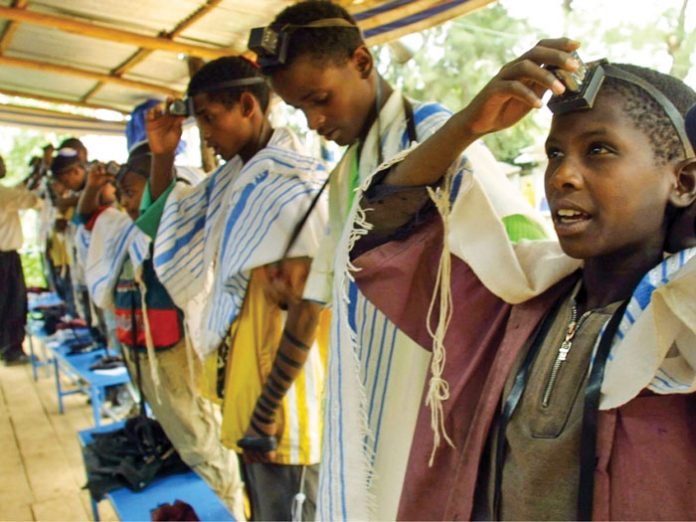1980
I’d always known that I was Jewish, a member of Beta Yisrael. We knew that Ethiopia wasn’t our true place and that we were different from our neighbors. It was very clear-cut, straightforward and unambiguous.
The women, including my mother, made our dishes out of pottery, and for Pesach they’d make new ones. There were nine Jewish families in our village of Adi Teleke in the Tigray region. All of our houses were built closely together, a few hundred feet away from the homes of our Muslim and Christian neighbors. Every Shabbat, one of the families would host all the rest of us for the day meal; we’d cook all week when it was our turn. Meat was a big part of the meal, and there was lots of injera, the traditional Ethiopian bread. We’d eat it with meat and peas or other vegetables on Shabbat, and we’d eat it with dairy during the week.
(I still make injera today, but not the same way my mother did. I make a quicker version, and it’s my family’s favorite dish.)
During mealtimes, we’d often sit and talk about Yerushalayim. I was four years old and there were several kids my age, some a little younger and some a little older. On Sukkot we’d play in the sukkah outside my house, a covered space that was big enough to hold all the Jews in our town.
We children didn’t go to school; we stayed home with our mothers and learned from their example. We were taught to have respect for our elders, and we’d help them in any way we could. The boys were in charge of taking care of the sheep and cows; the little kids like me would help fetch water from the lake. Everyone was busy working.
We didn’t have a synagogue, but all the men got together to pray. We had a Torah scroll, called an Urit—from the Aramaic word Oraita, meaning Torah—but it wasn’t written in Hebrew. It was written in another Semitic language called Ge’ez, which shares many root words with Hebrew.
We didn’t speak any Hebrew, but we prayed in our own language, and from our hearts.
There was a big synagogue in another town, where the kess lived, which is what we call our rabbis. There were 30 Jewish families in that town. Every holiday, all the Jews in the outlying villages (the smallest one had only two families; ours was average-sized with nine) would go to the town of the kess and stay with the local families. It took several hours of walking to get there. The holidays were very inspirational, and the kess would teach us about our religion.
All of our traditions had been passed down from generation to generation. We knew certain parts of the Torah, but none of the Oral Law, the Torah Sheb’al Peh, as we had left Eretz Yisrael before the first Beit Hamikdash was destroyed. However, we were very strict about keeping Shabbat, brit milah and taharat hamishpachah. And we observed all the holidays except for Purim and Chanukah.





















